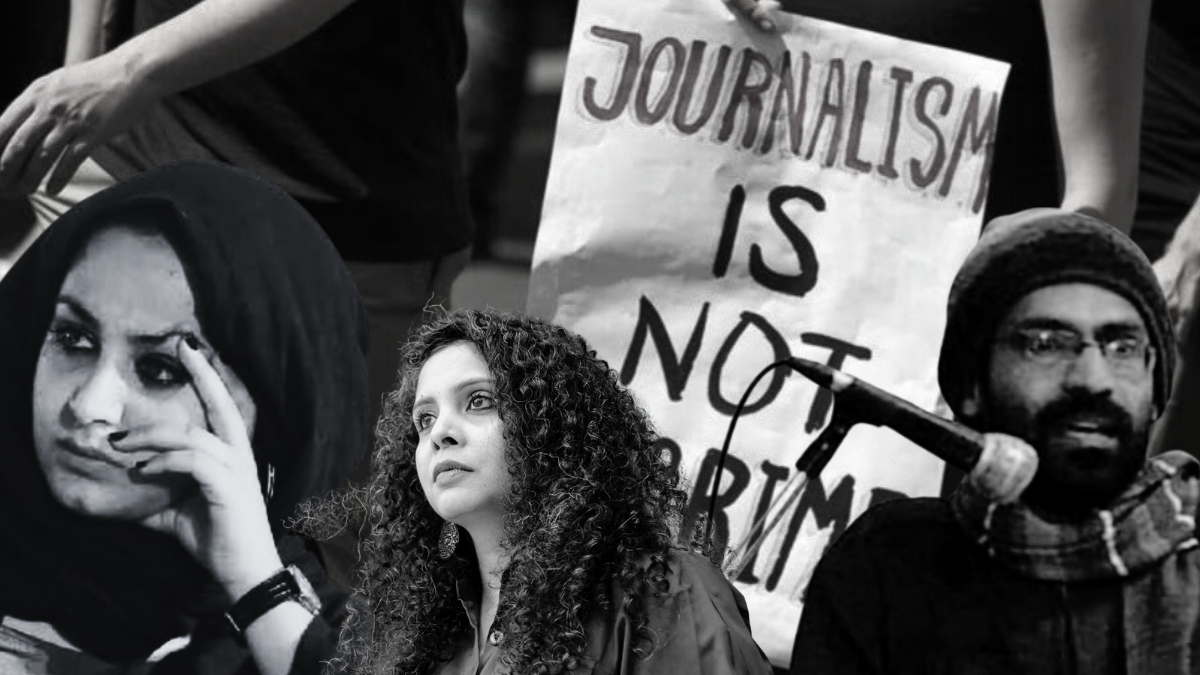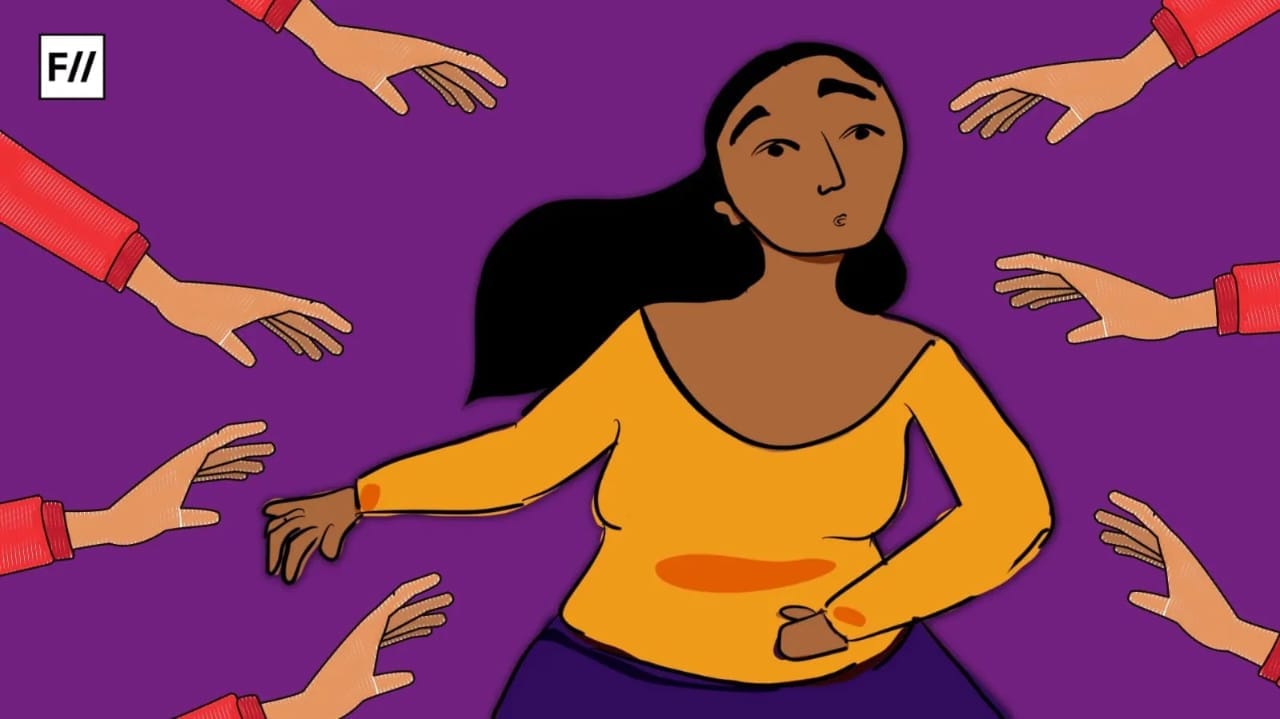“Imagine waking up at 1 in the night to video calls, sexually explicit messages, one after the other, nudes, calls that won’t stop ending,… You don’t know what hit you. Check the internet and find a rabid Hindu nationalist posting your number on Twitter. The comments below the tweet resemble a virtual lynch mob out to strip you of your dignity,” Ayyub posted on social media.
In a recent frantic post on social media, Rana Ayyub revealed the most gruesome details of yet another Hindutva attack against her involving doxxing, trolling, and technology-facilitated gender-based violence. She recounted how this ordeal has been giving her sleepless nights. Ayyub is not the only Muslim journalist in India who faces such vitriol of virtual harassment, sometimes even translating into tangible violence. Yet, Ayyub has consistently been at the forefront while enduring hatred and vitriol from Hindutva chauvinists because of her constant condemnation and disclosure of the Hindutva’s crooked schemes and persistent violence towards minorities.
In July, Meer Faisal, an independent journalist who covers violence against minorities and hate crimes, sent a legal notice to Op India, a far-right Hindutva-based news organisation, for publishing bogus and defamatory articles about him. The Hindutva media organisation has been known to publish articles against Muslims and has contributed highly towards the ecosystem of disinformation in India.
Many Muslim women journalists, Ismat Ara and Quratulain Rehbar, among others, were targeted through Bulli Bai and Sulli deals under a fake auction. These Muslim women journalists were targeted by trads, an uber-conservative group within the Hindutava ecosystem, to dampen their strength and resilience.
In essence, it is not solely a select group of Muslim journalists with a prominent presence on social media and in media circles who encounter harassment, abuse, and targeted trolling from Hindutva; it also includes Alishan Jafri, Fatima Khan, Aslah Kayyalakkath, Meer Faisal, and Shaheen Abdullah, among others, who are suffering the full impact of Hindutva’s insidious and systematic assault, intensified by the state’s complicity.
The state is in denial
The incumbent government, entrenched in Parliament for decades, together with the Hindutva Bridge, incessantly boasts about India’s free press and the purported diligence of journalists, asserting that there is no criticism or dissent.
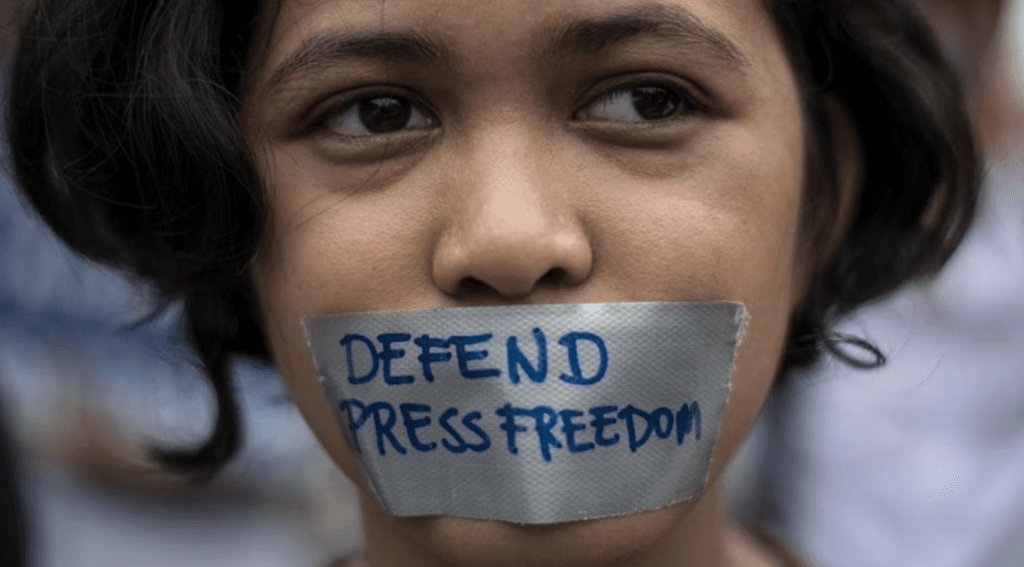
According to Foreign Policy, the Prime Minister said: “A democracy like India is able to move ahead and function only because there is a vibrant feedback mechanism,” Prime Minister Narendra Modi said in an interview with Newsweek in April, days before voting in the Indian general election began. “Our media plays an important role in this regard.” Modi added that the “claims of diminishing media freedom” in India were “dubious.”
Nevertheless, an examination of the different factors characterising a free press reveals that India consistently ranks among the lowest. Global press freedom indices and organisations consistently rank India among the lowest. Since Modi assumed power in 2014, India has consistently declined in the World Press Freedom Index. India ranks at 159 out of the 180 countries in the 2024 Press Freedom Index.
According to Amnesty International, “The rights organisation has repeatedly flagged authorities’ targeting of journalists, coupled with a broader crackdown on dissent that has emboldened Hindu nationalists to threaten, harass, and abuse journalists critical of the Indian government.”
While the country’s press is in the poorest of conditions, the country’s premier boasts the country of being “democratic” with no “discrimination.” Pressing one’s gaze towards Kashmir, many Muslim Kashmiri journalists, Irfan Mehraj, and others are currently incarcerated under the draconian UAPA. Under the UAPA, Kashmiri Muslims and Muslims, in general, have frequently been targeted and may be arrested on the grounds of suspicion of engaging in unlawful activities, such as sedition, terrorism, and anti-national actions, without a legal proceeding for two years.
The current government’s congruence with the Hindutva ideology and its brigade is what is putting the state’s response to Muslim journalists being targeted, trolled, and harassed under question. Recently, the handshake of former Chief Justice of India DY Chandrachud with the premier is a double whammy, as now the executive, as well as the judiciary, confluence towards a Hindutva ideology.
Hindutva is a dangerous ideology that has no place for Muslims and minorities, so the case of Indian Muslim journalists finding any solace in the state’s machinery and redressal is a far-fetched idea and a fool’s hope.
Hindutva’s fetish with Muslim Journalists
Hindutva is mainly a vile congress of upper-caste Brahmins, which has a gruesome and violent stance on anyone outside this cadre; Muslims and lowered castes are the other for them. Impure, foreign, and dirty. Their main day-to-day job is to unleash horrors on Muslims, their culture, heritage, and history. Social media is rife with vile comments, trolling, and attacks akin to what Ayyub called a virtual lynch mob.
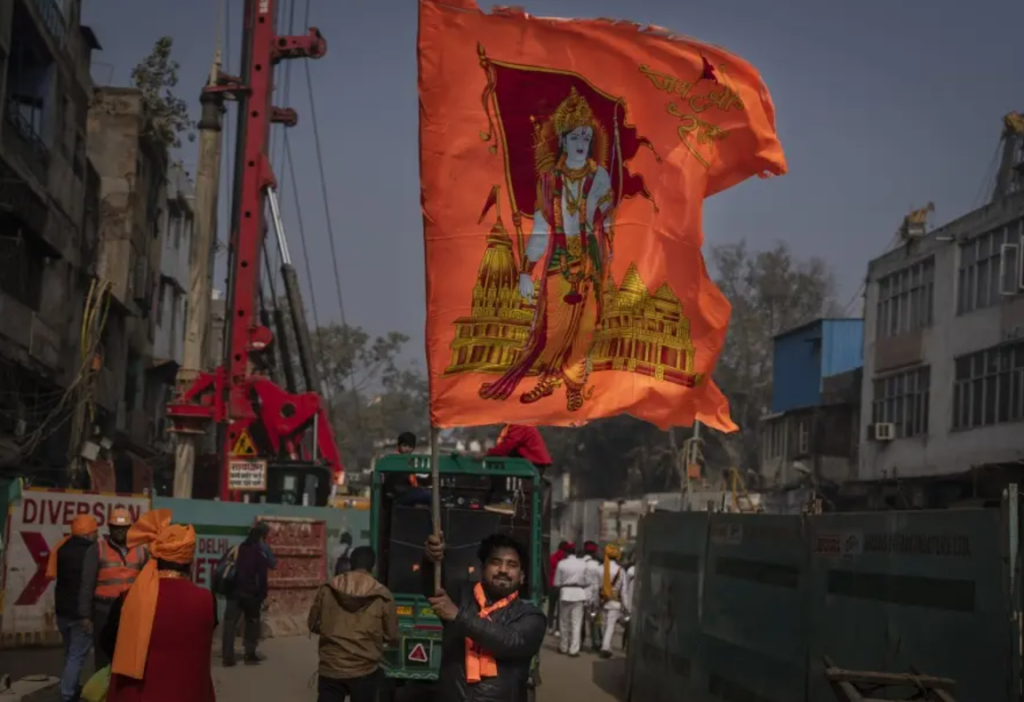
In the face of this hate, Muslim journalists show resistance and industry to bring to light the hate crimes, violence, and other forms of oppression Hindutva perpetrates against Muslims and other minorities. Sometimes their radar of hate extends to any journalist showing the truth; the case in point is Ravish Kumar.
According to a report by Scroll, in 2022, several journalists present in an event called Hindu Mahapanchayat were targeted by the mob. “Four of the five journalists who were escorted away by the police were Muslims and were targeted allegedly after being asked their religious identity,” reports Scroll.
Saima*, a 31-year-old journalist covering gender and politics, mentions that every time she publishes an article on social media, she gets comments that immediately discard her work as a journalist based on her Muslim identity. ‘If you look at the comments, they are so vile. I am told, what else will a Muslim say? Muslims want to divide the country, etc.’
In addition to this, she gets hateful messages, like “We will not read your article,” “Mulli” and “We will take action against you.”
Such comments are part of her everyday life; sometimes she questions her work as well as her choice of profession.
Danish Pandit, an independent journalist and documentary filmmaker who covers politics, communal violence, and hate crime, mentions, ‘There are times when I am covering communal clashes and violence, I feel sacred as a Muslim. Whenever I post my work on social media about communal violence, I get trolled heavily, which impacts my spirit as a journalist.’
Danish, however, becomes a bit hopeful when he gets appreciation for his work. But he feels sometimes there is no point as ‘nothing substantial happens, no FIRs are registered, and the government doesn’t take cognisance of the issues we raise.’
Targeting and online lynching: What it does to Muslim journalists
Often these vile attacks and systematic violence demoralise and discredit Muslim journalists, rendering their work ineffective and futile. Frequently, reports and stories written by Muslim journalists on sensitive subjects such as hate crimes, violence, gender-based violence, and Islamophobia are disregarded due to their identities. This thus imposes imposter syndrome upon them. There are tens of thousands of Hindutva profiles on social media constantly trolling Muslim journalists. Despite this, Muslim journalists push forth their work and dedication.
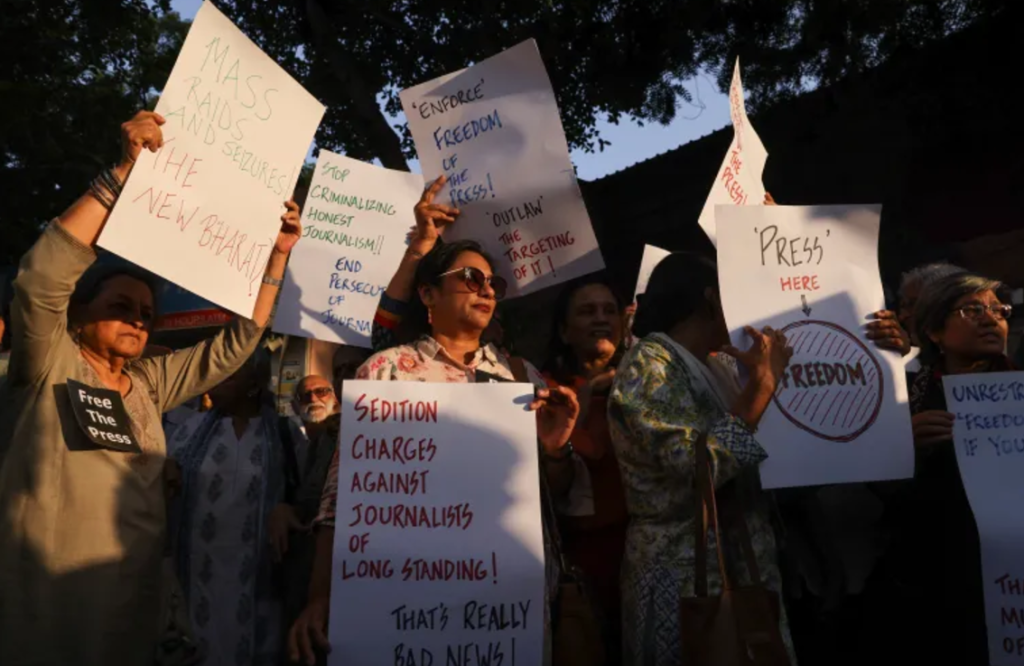
In response to these many attempts by Hindutva to silence Muslim journalists, many new media platforms have risen to expose this ideology of hate and the government’s inaction in safeguarding the rights of Muslims. Portals like Maktoob media, The Observer Post, Clarion India, etc. have emerged in the past ten years of the Modi government to report on issues like lynchings, hate crimes, Islamophobia etc.
According to Scroll “Maktoob is not the only digital publication doing this. As Hindu majoritarianism grew entrenched in Indian politics and news in the mainstream media demonised Muslims, TwoCircles.net, Clarion India and Milli Gazette, as well as a number of YouTube channels, have also devoted themselves to offering Muslim perspectives on developments.”
The report further mentions, “With lakhs of impressions and views, these websites and YouTube channels have built a loyal audience over the years. They report on how Muslim youth are targeted by law enforcement agencies, on lynchings, hate crimes and communal riots. But that is not all. As many of the journalists involved pointed out, they portray a world where Muslims are not always victims but a part of everyday Indian life.”
Aslah Kayyalakkath, Founder and Editor of Maktoob Media, an independent media platform focusing on Muslims and caste minorities, has been going through vile hatred and targeted trolling from Hindutva since 2019 because of his identity as a Muslim and his association with Maktoob Media.
‘I have been receiving calls from Hindutva associates frequently—at least two to three times per day—since 2019, almost every day. This is not an exaggerated claim. The callers include university students, common people, and even women, with no time restrictions; they call even at midnight.’
He further says, ‘Their main accusation is that Maktoob has posted Hinduphobic content on Instagram, shared videos that hurt Hindus, and posted Facebook content against Hindus. They label me as a biased Muslim journalist who receives funding from Pakistan and Afghanistan. They send Islamophobic and derogatory memes as well as sexist messages, targeting women in my family—my wife, sister, and mother.’
When asked if such hatred and targeted violence impacts the functioning of Maktoob, he says, ‘We don’t entertain hate, and it doesn’t affect us because these are just propaganda and false accusations.’
State is responsible
The state, with both its judiciary and executive, cannot wash off its hands of a problem it has fostered all these years. The state is responsible for ensuring and guaranteeing the rights of minorities within the framework of the constitution and judiciary. While both quite apparently are playing second fiddle to the Hindutva, the violence, othering, and invisbilisation of minorities are getting negated.
The state has to note and make amends in itself as the Hindutva and the problems it has been creating are an extension of the state. The state also has to understand that without solving the problems of Muslims, it cannot fare as a secular and democratic state.
*names have been changed to protect the identities and privacy.
About the author(s)
Shahinda is a multimedia journalist with an experience of more than five years. She has an interest in covering politics, gender, conflict, and gender-based violence/crime. In addition, she has experience in reporting, photography and documentary filmmaking. She has done her Masters in Mass Communication from AJK MCRC Jamia Millia Islamia, New Delhi.
